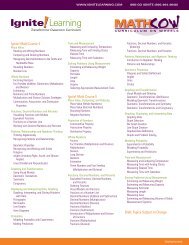The Silent Epidemic: Perspectives of High School ... - Ignite! Learning
The Silent Epidemic: Perspectives of High School ... - Ignite! Learning
The Silent Epidemic: Perspectives of High School ... - Ignite! Learning
Create successful ePaper yourself
Turn your PDF publications into a flip-book with our unique Google optimized e-Paper software.
<strong>The</strong> <strong>Silent</strong> <strong>Epidemic</strong><br />
involved in their children’s schooling, with only<br />
one-fifth “very” involved. More than half <strong>of</strong> those<br />
who were involved at all were involved “mainly for<br />
discipline reasons.”<br />
<strong>The</strong> majority <strong>of</strong> parents were “not aware” or<br />
just “somewhat aware” <strong>of</strong> their child’s grades or<br />
that they were about to leave school. Nearly half<br />
<strong>of</strong> the respondents said their parents’ work schedules<br />
kept them from knowing more about what<br />
was happening at school and 68 percent said<br />
their parents got more involved when they<br />
became aware their child was on the verge <strong>of</strong><br />
dropping out.<br />
Respondents who said that their parents were<br />
not involved in school were more likely to drop<br />
out in the first two years <strong>of</strong> high school than<br />
those who said their parents were involved even<br />
when they were not in trouble. Students said their<br />
parents were much more involved in middle<br />
school but gave them more responsibility and<br />
freedom in high school.<br />
Students also needed more supervision at<br />
home and in school; only 47 percent <strong>of</strong> the former<br />
students we surveyed said they or their parents<br />
would even be contacted by the school if they<br />
were absent. This pattern continues after participants<br />
drop out, with 48 percent <strong>of</strong> dropouts<br />
saying their school contacted them or their<br />
parents to find out why they left school or to<br />
encourage them to return. But this means that<br />
in the majority <strong>of</strong> cases, such contact may not<br />
even occur.<br />
In hindsight, young people who dropped out<br />
<strong>of</strong> school almost universally expressed great<br />
remorse for having left school and expressed<br />
strong interest in re-entering school with students<br />
their age.<br />
<strong>The</strong>ir Regrets<br />
One 17-year-old male in our focus groups put<br />
it simply, “It’s important to get an education to<br />
do well in life.” A 19-year-old female said <strong>of</strong> dropping<br />
out, “I wouldn’t make the same decision. I<br />
would stay in school.” A female from Baltimore<br />
put it succinctly, “I think it’s one <strong>of</strong> the worst<br />
regrets <strong>of</strong> my life.”<br />
<strong>The</strong>y said they did not think <strong>of</strong> their future<br />
10<br />
“… I would tell him like, I haven't<br />
finished high school. I don't have a<br />
diploma. I don't have a job. I am<br />
broke …. You can't make it without<br />
that. You can't go anywhere, for real,<br />
on the legal side…. If you go to<br />
school, get your diploma, you can<br />
do more things the right way. You<br />
might succeed.”<br />
when deciding to drop out but wanted freedom<br />
or money right then, or gave up on their dreams<br />
because graduation seemed far away. This conforms<br />
to models <strong>of</strong> adolescent psychology that<br />
have found adolescents have difficulty with<br />
long-term planning and delayed gratification. 31<br />
But as adults, four out <strong>of</strong> five poll participants<br />
said that graduating from high school is very (60<br />
percent) or fairly (21 percent) important to success<br />
in life. Seventy-four percent <strong>of</strong> our survey<br />
respondents said they would have stayed in<br />
school, knowing what they know today about the<br />
expectations <strong>of</strong> the world, and 76 percent said<br />
they would definitely or probably re-enroll in a<br />
high school for people their age if they could. At<br />
the time <strong>of</strong> their decision to leave high school,<br />
fifty-three percent had planned to go back and<br />
graduate. Since that time, however, only 11<br />
percent have actually gone back and graduated.<br />
In the survey, 47 percent said that not having<br />
a diploma makes it hard to find a good job.<br />
Participants in our focus groups counseled others<br />
to stay in school for this reason. For instance, a<br />
male from Philadelphia said, “… I would tell him<br />
like, I haven’t finished high school. I don’t have a<br />
diploma. I don’t have a job. I am broke …. You<br />
can’t make it without that. You can’t go anywhere,<br />
for real, on the legal side…. If you go to<br />
school, get your diploma, you can do more things<br />
the right way. You might succeed.”<br />
Participants in the focus groups wished they<br />
had listened to those who warned them <strong>of</strong> the








